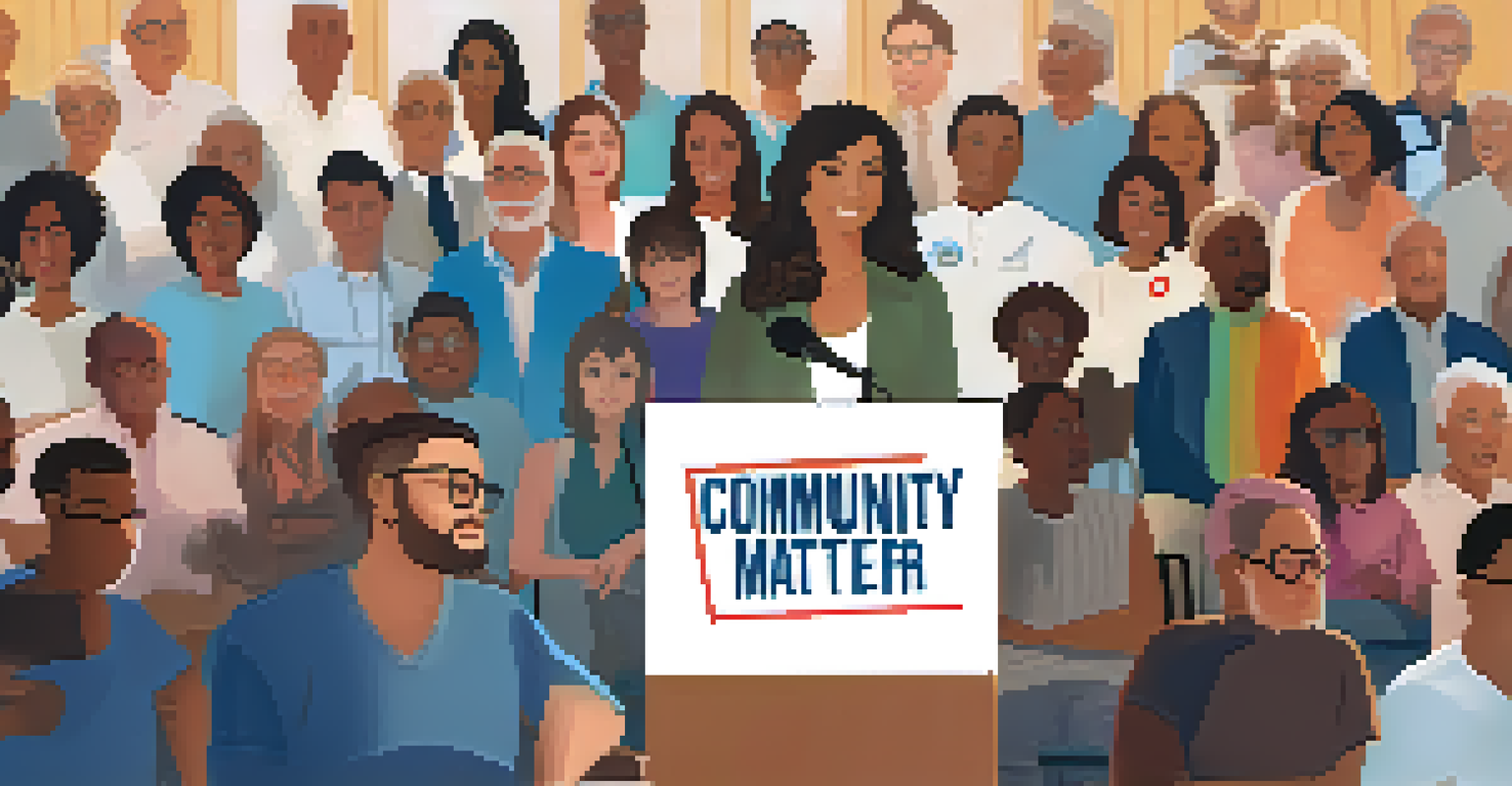Civic Engagement and Its Impact on Community Development in LA

Understanding Civic Engagement and Its Importance
Civic engagement is the active participation of individuals in their community, influencing decisions that affect their lives. In Los Angeles, this can mean anything from voting in local elections to participating in neighborhood councils. The importance of civic engagement lies in its ability to empower citizens, giving them a voice and a stake in community matters.
Civic engagement is not just about voting; it's about being part of the community and making a difference.
When residents engage, they foster a sense of ownership and responsibility toward their environment. This connection can lead to more informed decision-making and a greater likelihood of positive change. For example, when community members voice their opinions on city planning, it ensures that developments reflect the needs and desires of the people living there.
Ultimately, civic engagement serves as a bridge between citizens and governmental bodies. By encouraging dialogue and collaboration, communities can tackle issues more effectively, leading to stronger, more cohesive neighborhoods.
The Role of Local Organizations in Civic Engagement
Local organizations play a pivotal role in fostering civic engagement by providing resources and platforms for community participation. Groups like neighborhood associations and advocacy organizations create opportunities for residents to come together and discuss local issues. These organizations often serve as a voice for underrepresented communities, ensuring diverse perspectives are heard.

For instance, organizations that focus on environmental justice might organize clean-up events, inviting residents to participate and learn about sustainability. These activities not only beautify neighborhoods but also educate and motivate citizens to take an active role in their community’s well-being. As residents work together, they build connections that strengthen their bonds.
Civic Engagement Empowers Communities
Active participation in local issues gives citizens a voice and fosters a sense of ownership in their community.
Moreover, these local groups often work hand-in-hand with city officials, advocating for policies that benefit the community. By collaborating with civic leaders, they can influence legislation that addresses critical issues such as housing, transportation, and education.
How Civic Engagement Influences Policy Making
Civic engagement is crucial in shaping the policies that govern communities. When citizens actively participate, they can directly influence local policy decisions. This involvement ensures that the government is responsive to the needs and desires of its constituents, making policies more representative of the community's interests.
The best way to find yourself is to lose yourself in the service of others.
For instance, public hearings allow residents to express their opinions on proposed legislation or development projects. When citizens show up, they signal to policymakers that these issues matter, potentially swaying their decisions. This democratic process not only empowers individuals but also fosters a sense of community ownership over local governance.
In Los Angeles, successful civic engagement has led to the implementation of policies that address pressing issues, such as affordable housing and public transportation improvements. These changes not only enhance the quality of life for residents but also create a more inclusive and equitable environment.
Civic Engagement and Economic Development
There is a strong connection between civic engagement and economic development in communities. When residents are involved in decision-making processes, they contribute to creating a vibrant local economy. Engaged citizens often advocate for resources and programs that stimulate growth, such as small business support and job training initiatives.
For example, community forums where local businesses can present ideas encourage collaboration and innovation. By fostering relationships between entrepreneurs and residents, civic engagement helps create an atmosphere where economic development can thrive. This symbiotic relationship benefits everyone, creating jobs and enhancing the overall quality of life.
Local Organizations Drive Participation
Neighborhood associations and advocacy groups create platforms for residents to engage and influence local decisions.
Moreover, communities that prioritize civic engagement tend to attract more investment. Investors are often more willing to support neighborhoods where residents are active and invested in their community's future, leading to sustainable growth.
Building Social Cohesion Through Civic Engagement
Civic engagement not only strengthens local governance but also builds social cohesion among residents. When people come together to work on community projects, they forge connections that transcend differences. This sense of belonging is crucial in a diverse city like Los Angeles, where varying backgrounds can sometimes lead to division.
Participatory events, such as community festivals or clean-up days, bring people from different walks of life together for a common cause. These shared experiences help break down barriers, fostering understanding and empathy among neighbors. As individuals engage with one another, they develop a collective identity that unites them.
Ultimately, strong social cohesion leads to more resilient communities. When residents feel connected, they are more likely to support one another in times of need, creating a safety net that benefits everyone.
Youth Engagement: The Future of Civic Participation
Engaging youth in civic activities is essential for the future of community development. Young people bring fresh perspectives and innovative ideas that can rejuvenate community initiatives. By involving them in decision-making processes, we not only empower the next generation but also ensure that their voices are represented.
Programs aimed at youth engagement, such as leadership workshops and mentorship opportunities, can spark interest in civic participation. For instance, when students are encouraged to participate in local government meetings or community projects, they learn about the importance of their role as active citizens. This early involvement can lead to lifelong habits of engagement.
Youth Engagement Shapes Future Leaders
Involving young people in civic activities encourages their development as informed citizens and future leaders.
Moreover, when youth are engaged, they often influence their peers and families, creating a ripple effect that enhances community participation overall. Investing in youth engagement today means cultivating informed leaders for tomorrow.
Challenges to Civic Engagement in Los Angeles
While civic engagement has numerous benefits, Los Angeles faces challenges that can hinder participation. Barriers such as language differences, lack of awareness about civic processes, and socioeconomic factors can prevent residents from getting involved. Recognizing these challenges is the first step toward creating a more inclusive environment.
For example, many immigrants may feel intimidated by the political system or lack the necessary information to engage effectively. Addressing these barriers requires targeted outreach efforts, such as multilingual resources and community education programs. By making civic processes accessible, more residents can participate and contribute.

Additionally, fostering a culture of engagement takes time and persistence. Community leaders must work consistently to build trust and demonstrate the value of civic participation, ensuring that all voices are heard and valued.